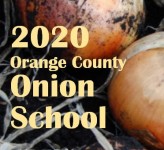2020 Orange County Onion School
Event Details
Date
March 6, 2020
Time
8:45am - 3:45pm
Location
Pine Island Fire Department
684 County Road 1
Pine Island, NY 10969
Cost
ENYCHP/CCEOC Enrollee : $60.00
(addl attendee $60.00 ea.)
Non-enrollee : $85.00
(addl attendee $85.00 ea.)
Host
Eastern New York Commercial Horticulture
8:45-9:00 Sign In, DEC Credit Registration
9:00-9:15 Welcome, Ethan Grundberg- CCE Eastern NY Commercial Horticulture Program
9:15-9:35 Dipping Bare Root Plants in Biologicals to Mitigate Pink Root, Ethan Grundberg- CCE ENYCHP
Grundberg will present data from two-years' worth of trials screening biostimulants and biofungicides as pre-plant dips of bare root transplanted onions. Specific attention will be paid to understanding the differences between biostimulants and biofungicides, label restrictions for pre-plant dips, and compatibility with other pre-plant incorporated pesticides for onion maggot, onion smut, and Pythium suppression. Finally, the pink root severity evaluation data will be discussed as well as the correlation between pink root severity and yield in the trial plots.
9:35-10:20 2019 Herbicide Trial Results and Recommendations, Christy Hoepting- CCE Cornell Vegetable Program
Hoepting will share results from several herbicide evaluations conducted during the 2019 growing season focused on both pre- and post-emergent applications for broadleaf control in muck-grown onions.
10:20-10:30 Coffee Break
10:30-11:05 Beneficial Nematodes to Manage Maggots, Denis Willett & Camila Filgueiras- CU Dept Entomology
Drs. Willett and Filgueiras will discuss their ongoing research using entomopathogenic nematodes (EPNs) to suppress several maggot species, including onion maggot (Delia antiqua) and seedcorn maggot (Delia platura), in specialty crop production systems. The presentation will focus specifically on compatibility with other pesticides, application methods, efficacy trial results, as well as the potential for EPNs to be incorporated in muck grown onion production in place of chlorpyrifos.
11:05-11:20 FSMA On-Farm Readiness Reviews and Worker Training, Nathaniel Lartey- CCE Orange County
Lartey will cover updates to the Food Safety Modernization Act focusing on major findings from the 2019 On-Farm Readiness Reviews and resources for compliance with worker training requirements.
11:20-12:00 Fungicide Resistance Development in Stemphylium Isolates, Dr. Frank Hay- CU Dept Plant Pathology
Dr. Hay has been collecting Stemphylium leaf blight (SLB) samples from New York onion farms for over three years in order to track the development of resistance to certain fungicide or FRAC groups within pathogen populations over time. Dr. Hay will update growers on the status of SLB resistance to FRAC groups 2, 7, 9, and 11 while reinforcing basic principles and best management practices for fungicide resistance management.
12:00-1:00 Lunch
1:00-1:45 Results from 2019 Fungicide Trials for Stemphylium Leaf Blight, Christy Hoepting- CCE CVP
Hoepting will review highlights from her continuing fungicide efficacy trials and discuss a number of suggested fungicide programs to manage resistance and provide sufficient suppression of SLB.
1:45-2:30 Timing Copper Applications to Reduce Bacterial Bulb Rot, Dr. Bhabesh Dutta- Univ of Georgia
Dr. Dutta will cover the lifecycle and basic biology of some of the most prominent bacterial pathogens responsible for bacterial bulb rots in onion production. Dr. Dutta will then discuss the efficacy of bactericides currently available as well as results from his trials evaluating the impact of timing copper applications at different crop developmental stages to better target the causal pathogens and reduced bulb rot incidence.
2:30-2:50 Updates to NY Labor Regulations and the FFLPA in 2020, Rich Stup- CCE Workforce Management
Stup will cover the basics of the Farmworker Fair Labor Practices Act and its implications for labor management in 2020 and beyond.
2:50-3:20 (30) Improving Fungicide and Insecticide Efficacy with Adjuvants, Ethan Grundberg- CCE ENYCHP
Grundberg will present preliminary results from the first year of trialing 9 different adjuvant chemistries in tank mixes with a commonly used fungicide, insecticide, and herbicide program for muck-grown onions in New York. Specifically, Grundberg will discuss impacts on onion thrips populations, Stemphylium leaf blight severity, and yield.
3:20-3:45 Final Remarks, Evaluations, DEC Certificate Distribution

Upcoming Events
Wine Sensory Evaluation Workshop
April 26, 2024 : Wine Sensory Evaluation Workshop
Staatsburg, NY
In collaboration with Jeremy Schuster, Viticulture Specialist at the ENYCHP, Dr. Anna Katharine Mansfield and Chris Gerling, Enology Extension Specialists with the Cornell Craft Beverage Institute, will be presenting a wine production-focused, interactive workshop on sensory evaluation.
What is my vine trying to tell me?
May 15, 2024 : What is my vine trying to tell me?
Plattsburgh, NY
Are your grapevines showing signs of discoloration or stunted growth? Don't ignore these warning signs! Join us on May 15th at the Cliton County CCE office to learn about the essential nutrients that grapevines require to thrive, identify the symptoms of nutrient deficiencies, and how to fix them. Don't miss out on this opportunity to improve your grapevine cultivation skills! Attendance is free, but registration is required.
How man's best friend can help find Spotted Lanternfly
May 21, 2024
Millbrook, NY
Come and join us at the Dutchess County CCE office on May 21st for a special demonstration by Jennifer Fimbel, the Agriculture and Horticulture Program Leader with Dutchess County CCE. You will get to see her SLF K9 Cole in action as they demonstrate how man's best friend can be used to detect the Spotted Lanternfly. Attendance is free, but registration is required












































